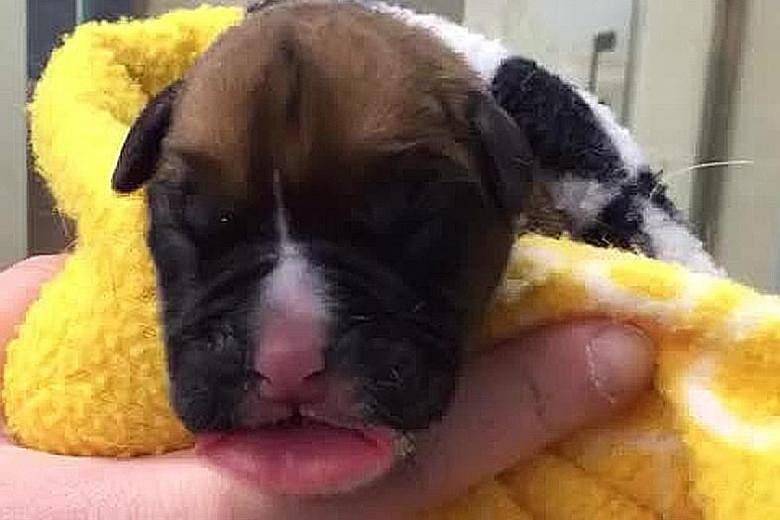LONDON • A British couple have made history by having puppies cloned from their dead pet, using tissue taken two weeks after it died.
Ms Laura Jacques, 29, and Mr Richard Remde, 43, were grief-stricken when their boxer dog, Dylan, died at the age of eight in June, having been diagnosed earlier this year with a brain tumour.
Scientists warned them that the technique - which costs £67,000 (S$140,000) per procedure - had never worked on dogs that had been dead for more than five days.
But against the odds, it was a success, producing two puppy embryos, according to a report in Britain's Guardian newspaper.
The couple enlisted the services of the controversial Sooam Biotech Research Foundation in South Korea, which offers a commercial dog-cloning service, said the Guardian.
The male puppy has been named Chance, after a character in Ms Jacques' favourite film, Disney's Homeward Bound.
It is expected to be joined tomorrow by a second cloned puppy - to be named Shadow, after another character in the film.
Ms Jacques said she and Mr Remde were overwhelmed after witnessing the birth by Caesarean section last Saturday in the operating theatre at Sooam.
"The whole thing just feels surreal," she said. "I was just clinging onto Richard for about an hour and a half after Chance was born.
"After they got him out, I still couldn't quite believe it had happened. But once he started making noises, I knew it was real. Even as a puppy of just a few minutes old, I can't believe how much he looks like Dylan. All the colourings and patterns on his body are in exactly the same places as Dylan had them."
The couple said the puppy was feeding well from its surrogate mother.
The couple had initially decided to store samples of Dylan's DNA with Sooam. The firm provided a kit to take a biopsy from the abdomen and Mr Remde travelled to South Korea in person to deliver it, according to the Daily Telegraph.
But the first samples failed, and by the time the second biopsy arrived, it was long past the usual cut-off point for successful cloning.
However, the scientists at Sooam decided to go ahead and push the boundaries of the technique.
Sooam has produced more than 700 dogs for commercial customers, said the Guardian. The technique involves implanting DNA into a "blank" dog egg that has had the nucleus removed.
Britain's Royal Society for the Prevention of Cruelty to Animals expressed concern about dog cloning, said the Guardian.
The newspaper quoted a spokesman as saying: "There are serious ethical and welfare concerns relating to the application of cloning technology to animals. Cloning animals requires procedures that cause pain and distress, with extremely high failure and mortality rates. There is also a body of evidence that cloned animals frequently suffer physical ailments such as tumours, pneumonia and abnormal growth patterns."
The couple are hoping to adopt the puppies' two surrogate mothers and take all four dogs back to Britain next July after a period of quarantine.

